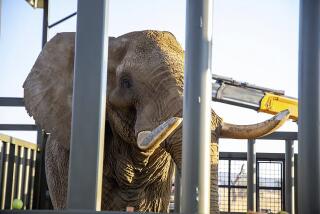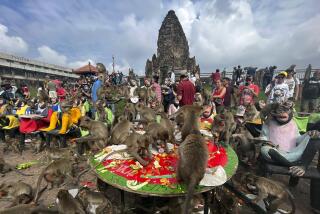Wild Elephant Catchers Are a Dying Breed in Cambodia
- Share via
POU ROBETH, Cambodia — In the old days when wild elephants roamed the Cambodian jungles, Chrem Klul, riding a tamed but imposing, tusked male, might track a herd for a week before attempting to lasso a prime adolescent by its hind leg.
The young animal would whimper, cry and struggle as elephants guided by Chrem Klul and other riders battered the captive into submission with their trunks. It was the first step in a process that would gradually turn the downed elephant to a life of domestication in the service of man.
Those times are gone, and Chrem Klul is one of the last surviving “kru” -- a master in the all but lost traditional skill of capturing elephants in the wild.
Chrem Klul, who says he’s 78, is a member of the Phnong ethnic minority, the most renowned elephant catchers among nearly a dozen tribes in northeastern Cambodia and nearby Vietnam.
He began leading expeditions in the 1950s. He says he caught about 30 elephants in a career that was violently punctuated by three decades of civil war and U.S. bombing during the Vietnam War.
His final hunt and catch was in 1983, Chrem Klul says in an interview at his one-room wood-and-thatch home in this village 200 miles from the Cambodian capital of Phnom Penh.
As his contemporaries die off, Chrem Klul is no longer surrounded by witnesses to his prowess in the daunting forests of the Phnong, where tigers, bears, snakes and elephants shared dense undergrowth and towering trees with the moody creatures and temperamental spirits of Cambodian myth and religion.
Today, his knowledge is no longer in demand. Motorbikes have replaced elephants as the most practical form of transportation between remote villages. Elephants are a rare sight in settlements and even rarer in the wild.
“Young people don’t know about elephants,” Chrem Klul lamented.
Rapidly decreasing forest cover from logging is pressuring Cambodia’s remaining wild elephants, estimated at between 200 and 400. Poaching for ivory also remains a problem.
More than 5,000 wild elephants roamed the countryside a century ago and some 2,000 were kept domestically, says Chheang Dany, the government’s elephant specialist. There are fewer than 100 domesticated animals now.
“I used to see huge herds,” Chrem Klul said. “Now, I see only bones of dead elephants.”
Sylvain Vogel, coordinator of the linguistics section at the Royal University of Phnom Penh, says six years researching the Phnong language and culture confirmed the changes.
“The elephant as one of the distinguishing characteristics of the Phnong way of life is basically gone,” Vogel said while visiting Chrem Klul’s isolated jungle hamlet, far from electricity, running water and telephone lines.
The Phnong hunt, gather and farm, and they used elephants to move logs, stones, goods and families.
In their animist religion, they pray to elephant gods for good health, robust harvests and safe journeys, and it’s forbidden to kill or eat the animals. A domestic elephant is honored in death with the same traditional funeral burial as a human.
“Elephants are the same as people, only stronger,” Chrem Klul said.
The Phnong believe that elephants are captured so they can return home. Their myths say that centuries ago, a Phnong couple was transformed into elephants and they linger today in the jungle as the gods Gnac and Gnwal.
“Elephants in legends appear to be human beings who became elephants,” Vogel said. “It explains why they’re treated well and why they allow themselves to be controlled by humans. They want to come back to the village.”
Phnong tradition required that elephants be captured, holding that breeding in captivity offends the gods as unnatural.
Expeditions to capture elephants were sacred. Before a hunt, chickens were sacrificed and their blood mixed with rice wine and applied to the heads of the elephants.
In the jungle, Phnong stalkers spoke in a disguised language to prevent spirits from understanding and warning the prey.
Chrem Klul says it took three months to tame an elephant and three years of grueling training to ready him for riding. Half of the elephants he caught died within a year, often felled by diseases.
“We cannot say the traditions are without cruelty,” he said.
More to Read
Sign up for Essential California
The most important California stories and recommendations in your inbox every morning.
You may occasionally receive promotional content from the Los Angeles Times.













